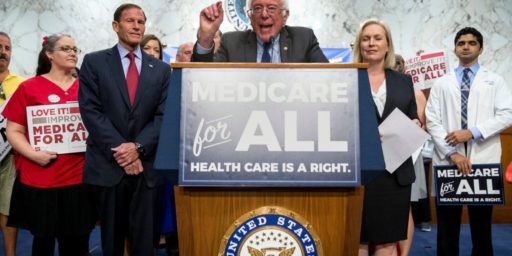Bidding War on Healthcare Reform?
Illinois Senator Barack Obama has announced his plan to make healthcare more available to all Americans:
IOWA CITY, Iowa – Seeking to add heft to his presidential bid, Democrat Barack Obama (news, bio, voting record) is offering a sweeping plan that would provide every citizen a means to have health coverage and calls on government, businesses and consumers to share the costs of the program.
Obama said putting in place universal health coverage has been debated for decades, but the time has finally come to act. He said his plan could save the average consumer $2,500 a year and bring health care to all.
“The time has come for universal, affordable health care in America,” Obama said in remarks prepared for delivery at the unveiling of his plan Tuesday in Iowa City.
A copy of his remarks and documents describing the program were obtained by The Associated Press.
Under Obama’s proposal, everyone would be able to obtain health insurance, and the Illinois senator would create a National Health Insurance Exchange to monitor insurance companies in offering the coverage. In essence, Obama’s plan retains the private insurance system but injects additional money into the system to pay for the expanded coverage.
Those who can’t afford coverage would get a subsidy on a sliding scale depending on their income, and virtually all businesses would have to share in the cost of coverage for their workers. The plan that would be offered would be similar to the one covering members of Congress.
His package would prohibit insurance companies from refusing coverage because of pre-existing conditions.
This plan sounds very similar to the Edwards healthcare plan to me. Perhaps some enterprising person could explain the differences to me.
I continue to be disappointed that more attention isn’t being given to the supply side of the healthcare equation. I’m skeptical that any reform plan can be sustained fiscally unless the supply bottlenecks are addressed, especially when the reform plans include increases in demand.






It is inaccurate to call Obama’s or Edward’s plans “health care” plans–rather they are health insurance plans.
They will do very little to reduce the high administrative costs associated with our current insurance system and there is little evidence to suggest that either of these plans will actually contribute positively to health outcomes.
As someone with a pretty decent health insurance plan, I would argue that insurance companies have an incredibly convoluted system of rationing care. This system–like all of the so-called “universal” systems being implemented at the state level–will simply make more people beholden to the capriciousness of insurance company bureaucrats to get decent care.
Dave,
I would agree that there has to be some supply-side solutions for administrative costs, unnecessary hospital visits and a reduced variation in costs for similar procedures, but if you look at the current system, cost just isn’t as big of a problem as the lack of insurance for so many Americans. You can provide all of the supply side solutions and we will still have 45+ million Americans without proper access to the system.
I think that Democrats realize that many conservatives would be just fine with supply side solutions without a care for the obvious demand for health care. So in a way, its the same logic of the more pragmatic anti-immigration foes who want border security first and immigration proposals second. I think that you would be hard pressed to find a liberal who doesn’t want to decrease the amount of health care costs per person to bring it in line with most industrialized countries, we just believe that until we provide more people with insurance we will just have a broken and costly health care system. Lets try fixing the system first and then deal with the costs.
You can’t separate these things. Costs are outrageous in the US system and it is because of the screwed up insurance system. More importantly, health care outcomes are deficient.
Half of bankruptcies in the US are due to debts racked up and 75% of those had insurance when they got sick. There has been a 2200% increase in medical bankruptcies since 1981 according to David Himmelstein of Harvard.
Per capita health spending in the US is 6,102 per year–highest in the world.
In Canada–the second highest–per capita spending is $3165.
Outcomes–especially in areas like chronic care–are lower in the US than in other countries with lower spending.
I’m curious about what you think can be done about the supply-side bottleneck. Sure we can eliminate waste in the administration side, but is that enough?
So, for $50 billion a year we can cover 45 million uninsured Americans? Great, then why does Medicare, which covers 1/3 less people cost 7 times as much as this plan?
How about Edwards, Obama, and Ms. Clinton work to get this program working as the “new Medicare”, and use the $300 billion a year in savings to cover everyone else. Then we wouldn’t need to hike anyone’s taxes to pay for it.
In fact, if the Obama/Edwards numbers are right, if we converted medicare to their programs, and used the saving to cover the uninsured, we’d still have $200 billion in surplus left over.
The possibilities are almost limitless. They include dramatically increasing the number of medical graduates produced annually (the present number hasn’t changed substantially in 25 years), changing the rules on telemedicine, eliminating anti-competitive state, local, and federal regulations, revising intellectual property laws, changing the laws on who gets to do what, increased automation, and so on.
Health insurance is expensive because healthcare is expensive. Healthcare is expensive because we’ve been throwing huge amounts of money at it for 40 years without increasing the supply nearly fast enough. If the costs of healthcare were a third (or less) of what it is now nobody would be concerned about the cost of health insurance (or the number of people concerned would be much, much smaller). Lots and lots of things (particularly technological things) are significantly cheaper now than they were 25 years ago but not health care because of the way that supply has been constrained.
How would you go about doing that? Doctors have one of the best paying jobs there are, what other incentives could you give? Is the limiting factor here lack of incentives, or the tough requirements to graduate with an MD?
I agree with changing laws on IP and patents, especially stopping the practice of re-patenting the same drug with only a slight variation. I’m also with you on automation, but the automation equipment is itself costly, and you have to charge the patient for using the automation to recoup the cost.
I think the biggest thing you mentioned was changing who gets to do what. For example, the last time my child got an ear infection, I knew it was an ear infection, but I still had to take her to her doctor, take up his (and his staff’s) time, take up space in an exam room, and pay for the disposable equipment they used to check her out. All because I couldn’t get her antibiotics without doing all of that. Now this would open the door to accidents and abuse by people who either don’t know or don’t care about how to take care of themselves, so it probably would never get passed.
Maybe we can certify people who take basic medical care training, so they can get certain prescription drugs in small quantities on their own, or decide to see a specialist without a referral. I’d pay the cost and put in the time if it means I don’t have to go through all that waste to get what I already knew I needed. Learning how to stitch a wound and diagnose common ailments would benefit anybody both financially and health wise. If I got a discount on my health insurance because of the certification, that would be icing on the cake.
Increase the number of positions available in med school and/or the number of med schools. They are limited by certification practices i.e. the AMA. This number hasn’t changed in more than a generation. Before that it hadn’t changed in nearly 50 years and was only increased when the feds agreed to pay $80,000 per medical resident (in present dollars). Relative to the population of the country we’re graduating a small fraction of the number of medical graduates we graduated a century ago.
The problem with getting more doctors also has to do with the fact that the job has become more of an administrative nightmare than a patient care business.
It’s also not as lucrative as many think unless you are in a specialty type job. General Practitioners, where the biggest need is, are at the low end of the bracket, but still have to contend with endlessly changing HMO, PPO, Medicare, Medicaid, requirements, paperwork,etc.
A friend who was in private practice as an OB/GYN was paying $300,000 a year for support staff just to deal with paperwork for himself and one PA. Add to that his $200k in malpractice premiums, office leases, equipment, taxes, student loans, etc, and suddenly that million and a half gross per year gets much smaller. Yes, he took home a nice check, but he went into a hospital instead to get rid of the admin burden.